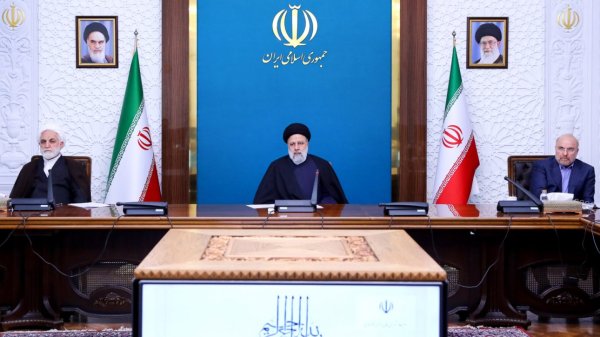
Iranian President Dr.Seyyed Ebrahim Raisi (Centre). Courtesy:President of Iran's official website
Washington/London/Tehran: The United States today (IST) asked Iran to immediately release the oil tanker it seized in the Gulf of Oman on January 11, 2024, and said it was closely consulting with its partners in the region about appropriate next steps that can be taken to hold the Iranian regime accountable.
Iran seized a vessel St. Nicholas, a Marshall Islands-flagged and Greek-owned oil tanker, with Iraqi crude destined for Turkey in retaliation for the confiscation last year of the same vessel and its oil by the U.S., Iranian state media stated as quoted by news agency Reuters.
The Iranian UN mission said that this was a lawful undertaking sanctioned by a court order that corresponds to the “theft of Iran’s oil by the United States last year”. The US countered it by reminding about its sanctions on Iran’s oil and petrochemical trade. “We have been warning for some time, including in a detailed business advisory to the industry in December, that would-be buyers of Iranian oil put themselves at risk of exposure to U.S. sanctions. And we take this opportunity to remind businesses that they must be vigilant to make sure that their supply chains are not exploited by the IRGC [The Islamic Revolutionary Guard Corps] and that other sanctioned entities – to conduct illicit activity or to evade U.S. sanctions as well,” a US State Department spokesperson said in Washington.
The seizure of the Marshall Islands-flagged St Nikolas coincides with weeks of attacks by Yemen’s Iran-backed Houthi militias targeting Red Sea shipping routes. The crisis in the region escalated on January 11, 2024, when the United Kingdom and the US forces made airstrikes at some facilities used by the Houthi rebel faction in Yemen to attack shipping in the southern Red Sea. While one was a site at Bani in north-western Yemen which the UK claimed was used to launch reconnaissance and attack drones, another was the airfield at Abbs. “Intelligence has shown that it has been used to launch both cruise missiles and drones over the Red Sea. Several key targets at the airfield were identified and prosecuted by our aircraft,” the UK Ministry of Defence stated today.
Iran today called the bombings by the US and UK forces “arbitrary” and condemned the attacks saying it “clearly” breached Yemen’s sovereignty and territorial integrity and was against international laws and regulations.
The Iranian Foreign Ministry spokesperson Nasser Kanaani stated in Tehran: “While the Zionist [Israeli] regime continues its strikes and war crimes in the Gaza Strip and the West Bank, the US and the UK are trying to distract the attention of the people in the world from Zionist regime’s crimes against the Palestinian people by expanding their support for the fake, criminal and aggressor regime.”
Kanaani warned of the repercussions of repeating such arbitrary attacks on regional and international peace and security, and stated, “The arbitrary attacks will have no result other than fuelling insecurity and instability in the region”. He called on the international community to act responsibly and stop the spread of war, instability and insecurity in the region.
In response, the US today targeted Iran’s financial support to the Houthis which it claimed fueled their unrelenting attacks on global commerce in the Red Sea and the Gulf of Aden. The US designated two companies that it claimed were involved in the shipment of Iranian commodities in support of the Iran-based, Houthi financial facilitator Sa’id al-Jamal and his network. “We are also identifying four vessels as blocked property in which these companies have an interest,” the US stated.
Iran on its part slammed the United Nations Security Council (UNSC) Resolution 2722 which was introduced and ratified with the United States at its core as the main supporter. Kanaani said, “The resolution allegedly seeks to protect navigational rights in the Red Sea, but in fact, it is a cover for fulfilling the US’s political goals in support of the Zionist regime and the continuation of the regime’s crimes against the defenceless people of Gaza.”
It may be mentioned that following naval interception by the United States and the United Kingdom of a barrage of missiles and drones fired from Houthi-controlled territory into the Red Sea on January 9, the Security Council on January 10, 2024, adopted a resolution demanding that the Houthis immediately cease all attacks on merchant and commercial vessels. The US and the UK rejected three amendments to the resolution moved by the Russian Federation, including one linking attacks to the Gaza conflict. The resolution was adopted by a vote of 11 in favour to none against, with 4 abstentions (Algeria, China, Mozambique, Russian Federation).
Iran today claimed that the US passed the UN Security Council resolution “by putting pressure on council members and by ignoring the root causes of the crisis and tension in the region, to allegedly focus on the navigational rights and freedom in the Red Sea”. Tehran said the main goal of the US was to “legitimize the self-styled US-led ‘naval coalition’ in order to achieve certain political goals and establish a shield it needs to help the Israeli regime continue its war crimes in Gaza”.
The US on its part, demanded that the Iranian Government must “immediately” release the ship St. Nicholas and its crew. “This unlawful seizure of a commercial vessel is just the latest behaviour by Iran – or enabled by Iran – aimed at disrupting international commerce. We believe this kind of action will simply add uncertainty for commercial shipping and regional and global economies. Iran and Iran-enabled provocative actions like this are a menace to the global economy, and it must cease. We in the United States will continue to work to deter and confront the full range of Iran’s concerning and destabilizing behaviours”, the State Department Spokesperson said. He reminded that about 30 per cent of global container shipping passes through the Red Sea, and Iran’s actions were “just going to put further burdens, add further uncertainty to global supply chains, to global economies, potentially even making it more burdensome to working families around the world, so – which is why the U.S. is continuing to – in close coordination, we’ll discuss with our regional partners about appropriate steps that can be taken”.
– global bihari bureau




